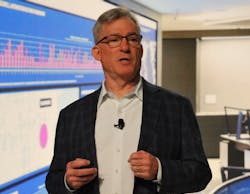Rockwell Automation’s expanding technology strategy
Resilient. Agile. Sustainable. These are the three key outcomes Rockwell Automation is focused on creating for users of its technologies, said Blake Moret, chairman and CEO of Rockwell Automation during the opening keynote at Automation Fair 2023. “Our job is to understand customers’ complex challenges, help them better define what the specific issues are and simplify the business of automation, because I still believe that's really what's going to set apart the winners and losers over the next decade.”
To do this, Rockwell is expanding on its core focus around production optimization to address resilience, human-centric automation, sustainability and digital transformation.
“Some of these things were not a big part of our portfolio 10 years ago. But we’re building around our core automation technologies to add production design, production control and production logistics in addition to edge and cloud-native applications,” said Moret. “We want to give customers a choice with cloud and edge because companies are at different points in their digital transformation journey. That’s why we’re looking at our roadmap to bring the best of both worlds together, such as with Plex and FactoryTalk, to meet you where you are in your journey. And this extends into logistics between machines with autonomous mobile robots, which have now become as important as fixed line control.”
Moret noted that building resilience in industry has become increasingly important since the COVID shutdowns, as it highlighted the need for redundant operations as well as the ability to better address unforeseen supply chain challenges. “We could not have conceived of the limited production that led to shortages of critical components as a result of COVID,” said Moret. “That’s why it’s critical to be able to forecast demand accurately to deal with that kind of volatility.”
He pointed to Plex DemandCaster (acquired by Rockwell Automation in 2021) as an example of how Rockwell Automation is helping its customers better understand the effects of demand on their supply chains. “We've talked about the idea of connected supply chains for years and customers intuitively know there are huge savings and efficiencies to be gained there,” said Moret. “That’s why we have significantly increased our capability to help deliver the connected supply chain and we will continue to invest in this area.”
Cybersecurity is another key factor of Rockwell Automation’s approach to resilient operations. “We just acquired Verve to significantly increase our capabilities with respect to cybersecurity to build on our services around that and help make our customers the hardest possible targets,” he said.
People and processes
Empowering people through a human-centric view of the plant floor is a “winning hand” for manufacturers when they can “energize people” with technologies they are more comfortable using, said Moret. “It may sound a little bit unusual for an automation company to talk about people as much as we do, but it’s so important because we’re in a period where workforce shortages are on a critical path to impact project completion across a lot of industries. That’s why making the most of scarce resources—by getting people comfortable with technology and properly equipping them—can be the difference between a successful and unsuccessful project.”
In line with the issue of scarce resources, Moret said to truly address the multiple dimensions of sustainability in the manufacturing industries, companies must start by “being better stewards of water and energy use.” From this starting point, Moret said Rockwell looks at the sources of energy used and concentrates on decarbonizing traditional sources of energy as well as speeding the production and capacity expansion of renewable energy. “And we can do all this multi-discipline control work with our basic control technologies. We’re doing it now with Occidental Petroleum on their 1PointFive large-scale, direct-air, carbon-capture project,” he said.
Another key technology trend Moret noted is how digital twins are increasingly being used to simulate manufacturing processes. Industrial companies can model their operations and gamify potential changes to the layout to be able to move faster, de-bottleneck production and incorporate new requirements—such as new packaging formats, he said. “The technology to do this is available today, meaning companies don’t have to run physical material through their processes for hours in a trial-and-error process,” he said. “Our tools, like Emulate3D in FactoryTalk Twin Studio, help manufacturers model those processes to simulate them and then transform them into more efficient operations.”
He added that Rockwell also has consulting services through Kalypso (acquired in 2020) to “accelerate this digital transformation and help customers define their problems up front to better address the change-management process. Because what begins as a glimmer in somebody's eye in corporate engineering will fail if plant operators don't feel empowered and engaged in that process.”
About the Author
David Greenfield
Automation World
David Greenfield joined Automation World in June 2011. Bringing a wealth of industry knowledge and media experience to his position, David’s contributions can be found in AW’s print and online editions and custom projects. Earlier in his career, David was Editorial Director of Design News at UBM Electronics, and prior to joining UBM, he was Editorial Director of Control Engineering at Reed Business Information, where he also worked on Manufacturing Business Technology as Publisher.


